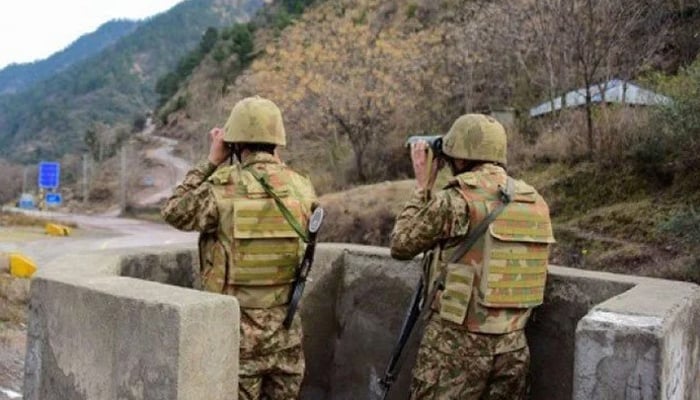From capture to fiction
However, what adds intrigue to this situation is discernible operational paralysis exhibited by Indian military leadership in aftermath
At 3:30 am on February 26, 2019, Mirage 2000 fighter jets of the Indian Air Force (IAF) crossed the Line of Control (LoC), initiating airstrikes on Balakot. At 05:45 am on February 27, Pakistan Air Force (PAF) F-16 fighter jets retaliated with airstrikes targeting five locations within Indian-occupied Kashmir, including Chakothi and Mirpur.
At 8:30 am, PAF jets engaged in aerial combat with IAF MiG-21 Bison fighters near Balakot. Two Indian jets were downed. At 9:00 am, Indian pilot Abhinandan Varthaman ejected from his MiG-21 Bison after being hit by Pakistani air defence fire and landed in Azad Jammu and Kashmir. He was captured by Pakistani forces. At 11:00 am, Pakistan announced it would return Wing Commander Varthaman as a gesture of peace. Between 10:00 am and 12:00 pm, when the IAF was at its highest alert level, an Indian Mi-17 helicopter carrying six IAF personnel, including a senior officer, was mistakenly hit by a friendly surface-to-air missile. All six personnel onboard were killed. At 5:00 pm, Wing Commander Varthaman was released at the Wagah border crossing.
India labeled Pakistan's retaliatory actions as an 'act of war'. However, what adds intrigue to this situation is the discernible operational paralysis exhibited by the Indian military leadership in the aftermath. Despite the severity of the circumstances and the provocative nature of the events, there was a noticeable hesitation or delay in the response from the Indian military.
This apparent reluctance suggests a state of operational paralysis, indecision, or inactivity. This aspect of the situation raises questions about the preparedness and decision-making processes within the Indian military structure during a period of heightened alert.
Pakistan’s decision to repatriate Wing Commander Varthaman exemplifies Pakistan’s strict adherence to international law. This decision also underscores Pakistan’s commitment to the principles outlined in the Geneva Convention. Pakistan’s gesture of compliance with established norms and international conventions garnered widespread international appreciation and praise for Pakistan's responsible and principled approach to upholding its international obligations.
From a purely military-strategic perspective, the events of February 27 marked a significant and dual blow to the Indian military, embodying both humiliation and military defeat. The failure of the Indian military, which is at least three times larger than Pakistan's, to deliver a proportionate response indicates operational paralysis within the Indian military hierarchy.
Fast forward to 2024: general elections in India are slated to take place between April and May. Ajay Bisaria, a staunch BJP supporter, former private secretary to PM Vajpayee, and a former diplomat, introduces ‘Qatl ki raat’ as a unique component of India's coping mechanism, crafted in response to past experiences of humiliation and military defeat. Woven into Modi's election campaign, ‘Qatl ki raat’ unfolds with a portrayal of nine fictional missiles directed at Pakistan alongside Ajay’s delusional ‘coercive diplomacy’ and his hallucinatory ‘midnight call’.
The undeniable facts persist: two Indian jets were downed by Pakistan, Wing Commander Varthaman was captured and subsequently repatriated, and the Indian military experienced a state of operational paralysis.
Fast forward to 2024, India’s response to the humiliation and military defeat involves adopting coping mechanisms, including the propagation of mythical stories, dissemination of distorted narratives, engagement in propaganda, fueling heightened nationalistic sentiments, orchestrating media and perception management, and manipulating facts, especially during election cycles. As another election season unfolds, the recurring phenomenon of 'Modi mania' resurfaces, demonstrating its distinctive influence by shaping and spinning the facts to align with its fallacious narratives.
The writer is a columnist based in Islamabad. He tweets/posts @saleemfarrukh and can be reached at: farrukh15@hotmail.com
-
 Shamed Andrew Wants ‘grand Coffin’ Despite Tainting Nation
Shamed Andrew Wants ‘grand Coffin’ Despite Tainting Nation -
 Keke Palmer Reveals How Motherhood Prepared Her For 'The Burbs' Role
Keke Palmer Reveals How Motherhood Prepared Her For 'The Burbs' Role -
 King Charles Charms Crowds During Lancashire Tour
King Charles Charms Crowds During Lancashire Tour -
 ‘Disgraced’ Andrew Still Has Power To Shake King Charles’ Reign: Expert
‘Disgraced’ Andrew Still Has Power To Shake King Charles’ Reign: Expert -
 Why Prince William Ground Breaking Saudi Tour Is Important
Why Prince William Ground Breaking Saudi Tour Is Important -
 AOC Blasts Jake Paul Over Bad Bunny Slight: 'He Makes You Look Small'
AOC Blasts Jake Paul Over Bad Bunny Slight: 'He Makes You Look Small' -
 At Least 53 Dead After Migrant Boat Capsizes Off Libya
At Least 53 Dead After Migrant Boat Capsizes Off Libya -
 'God Of War' Announces Casting Major Key Role In Prime Video Show
'God Of War' Announces Casting Major Key Role In Prime Video Show -
 Real Reason Prince William, Kate Broke Silence On Andrew Scandal Revealed
Real Reason Prince William, Kate Broke Silence On Andrew Scandal Revealed -
 Drew Barrymore Responds To 'Charlie's Angels' Costar's Comments About Her
Drew Barrymore Responds To 'Charlie's Angels' Costar's Comments About Her -
 Shakira Slips Hard On Stage During Life Show
Shakira Slips Hard On Stage During Life Show -
 King Charles Speaks Out Over Andrew's Scandal: 'Stand Ready To Help Police'
King Charles Speaks Out Over Andrew's Scandal: 'Stand Ready To Help Police' -
 Dax Shepard Recalls Horrifying Accident That Almost Killed Him
Dax Shepard Recalls Horrifying Accident That Almost Killed Him -
 Logan Paul's Bodyguard Hits Fan On Super Bowl Day
Logan Paul's Bodyguard Hits Fan On Super Bowl Day -
 Epstein Files: Anne Hathaway Mentioned As Highly Desired Guest For Bill Gates?
Epstein Files: Anne Hathaway Mentioned As Highly Desired Guest For Bill Gates? -
 Prince Harry Under A Lot Of Stress As Meghan Markle Makes Bizarre Demands
Prince Harry Under A Lot Of Stress As Meghan Markle Makes Bizarre Demands




